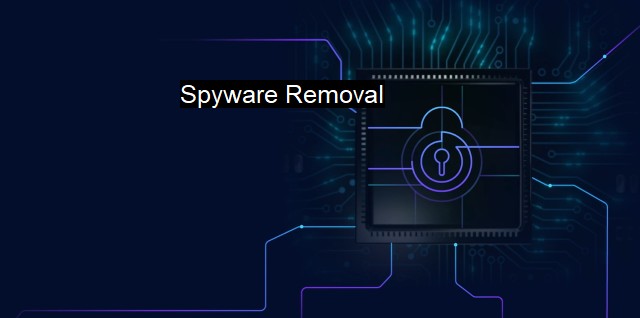What is Spyware Removal?
The Importance of Spyware Removal for Cybersecurity: Safeguarding Personal and Sensitive Data From Malicious Software Attacks
"Spyware Removal" constitutes a major concern and primary responsibility. The term "spyware" refers to a class of software designed to infiltrate computers or networks unnoticed, gathering important information, peeping into the target user's behavior, or diverting browsers towards certain websites. Like any disease that eating up healthy cells, spyware quietly infects healthy, efficient systems, turning them into slow, laggy, and virus-ridden torture devices. Consequently, spyware removal becomes necessary for maintaining an efficient, safe and secure network or computing ecosystem.Spyware usually enters systems disguised as trusted software or piggybacks on other downloaded files or programs. These malicious software hide in the deep recesses of the system, unnoticeable yet fully operational, ready to pilfer essential and private data. Some prevalent types of spyware include Trojans, adware, system monitors, cookies, and tracking cookies. Despite their diversity in operation, all kinds of spyware are essentially created to spy, steal, and siphon off essential data.
Spyware removal, thus, is the act of identifying, restraining, and completely eliminating these invasive programs from our systems. It involves using specialized software which actively seeks out these evils hiding stealthily inside the computer network. These are often included in comprehensive antivirus packages as one of the mandatory features. Yet, spyware removal programs or spyware removers are sometimes separately available as a dedicated tool focusing on tracking and removing sock lurking spyware.
The process of spyware removal begins with a fine-tooth comb scanning of the systems using the specialized software. Each file, application, and software component is examined for traces of spyware. Upon identifying these malicious threats, the software either attempts to quarantine the offending files at once or mark them for deletion. Sometimes, certain spyware can reassemble themselves after being deleted or quarantined, developing resistance against this preliminary line of defense. This is where advanced spyware removal strategies are designed to incapacitate the spyware before permanently deleting them.
Cybersecurity experts continuously emphasize the importance of regular scans to ensure early detection and effective removal of spyware. This is because spyware is sneaky and invades computers in multiple ways, either through a pesky popup ad on a webpage, a download from an untrustworthy site, or even through email links. Consequently, it could exist on systems without ever being detected by the user. Rigorous frequent scanning sponsored by autonomous spyware removal software thwarts these minute yet potentially dangerous threats and preserves our system's integrity.
Awareness against spyware is as essential as the spyware removal process. First, it is important to understand the threats lurking in the shadows of the worldwide web, beexperienced the various disguises that spyware employs to trick users into downloading them. Installing trusted spyware removal or antivirus software from verified developers, refraining from accessing insecure websites or downloading suspicious attachments are essential preemptive measures against spyware.
Spyware removal is more than a cybersecurity task - it's a continuous process that pairs technological defense mechanisms with intelligent usage behavior. Spyware, with their prevalent and persistent posing substantial threats, necessitates strong firm barriers in place safeguards valuable personal and professional data, preserves the smooth functionality of systems, and ensures a safe, secure, and respectful digital environment. Whether through a comprehensive antivirus program or a distinct spyware removal software, fending off these cyber threats is an inevitable obligation in today's digitized world.

Spyware Removal FAQs
What is spyware and why is it important to remove it from my computer?
Spyware is a type of malicious software that is designed to gather information about a user's activities without their knowledge or consent. It can be used to steal sensitive data, track online behavior, or even control a computer remotely. To protect your privacy and prevent any potential harm, it's important to remove spyware from your computer as soon as possible.What are some common signs of spyware infection on my computer?
Some common signs of spyware infection include slow computer performance, system crashes, pop-up ads, unexplained changes to your browser settings, and unauthorized access to your personal information. If you notice any of these symptoms, it's important to scan your computer for spyware and remove it immediately.How can I remove spyware from my computer?
There are a variety of methods you can use to remove spyware from your computer, including running a full system scan with antivirus software, manually deleting suspicious files and applications, and using specialized spyware removal tools. It's recommended that you use a combination of these methods for the best results, and make sure to keep your antivirus software up-to-date to prevent future infections.How can I prevent spyware from infecting my computer in the first place?
To prevent spyware from infecting your computer, it's important to practice safe browsing habits and avoid downloading any suspicious files or programs. You should also keep your antivirus software up-to-date and use a firewall to block unauthorized access to your system. Additionally, you can use ad-blocking and anti-tracking extensions in your web browser, and avoid clicking on any pop-up ads or suspicious links.| | A | | | B | | | C | | | D | | | E | | | F | | | G | | | H | | | I | | | J | | | K | | | L | | | M | |
| | N | | | O | | | P | | | Q | | | R | | | S | | | T | | | U | | | V | | | W | | | X | | | Y | | | Z | |
| | 1 | | | 2 | | | 3 | | | 4 | | | 7 | | | 8 | | |||||||